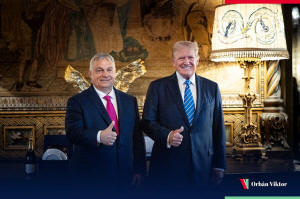Hungary's Orban, a NATO outlier on Ukraine, talks 'peace mission' with
Trump
 Send a link to a friend
Send a link to a friend
 [July 12, 2024]
By Gram Slattery, Steve Holland and Simon Lewis [July 12, 2024]
By Gram Slattery, Steve Holland and Simon Lewis
WASHINGTON (Reuters) -Hungarian Prime Minister Viktor Orban met with
Donald Trump on Thursday and the pair discussed the "possibilities of
peace", a spokesperson for the prime minister said as he pushes for a
ceasefire in Ukraine.
Trump and Orban met at Trump's Mar-a-Lago home in Florida "as the next
stop of his peace mission," Orban's spokesperson said. "The discussion
was about the possibilities of peace"
Nationalist leader Orban, a long-time Trump supporter, made surprise
visits to Kyiv, Moscow and Beijing in the past two weeks on a
self-styled "peace mission", angering NATO allies.
His meeting in Moscow with Russian President Vladimir Putin in
particular vexed some other NATO members, who said the trip handed
legitimacy to Putin when the West wants to isolate him over his war in
Ukraine.
Orban traveled to Kyiv before visiting Moscow but did not tell Ukrainian
President Volodymyr Zelenskiy about his mission to Russia, Zelenskiy
said, dismissing Orban's ambition of playing the peacemaker.

"Not all the leaders can make negotiations. You need to have some power
for this," Zelenskiy said earlier at a news conference at the NATO
summit.
White House National Security Adviser Jake Sullivan, when asked about
Orban's initiative, said Ukraine would be rightly concerned about any
attempt to negotiate a peace deal without involving Kyiv.
"Whatever adventurism is being undertaken without Ukraine's consent or
support is not something that's consistent with our policy, the foreign
policy of the United States," Sullivan said.
Orban's self-styled peace mission has also irked many members of the
European Union, whose rotating presidency Hungary took over at the start
of this month.
The Hungarian embassy in Washington declined to comment on the planned
meeting with Trump, which was first reported by Bloomberg.
Orban has been attending a NATO summit hosted by Democratic President
Joe Biden. Hungary's delegation voiced opposition to key NATO positions,
while not blocking the alliance from taking action.
Foreign Minister Peter Szijjarto told Reuters on Wednesday that Hungary
believes a second Trump presidency would boost hopes for peace in
Ukraine.
Orban hoped to bring an end to the war through peace talks involving
both Russia and Ukraine, according to Szijjarto.
[to top of second column]
|

Hungarian Prime Minister Viktor Orban meets Donald Trump at Trump's
Mar-a-Lago home in Florida, U.S., July 11, 2024 in this picture
obtained from social media. Viktor Orban via X/via REUTERS

Trump has said he would quickly end the war. He has not offered a
detailed plan to achieve that, but Reuters reported last month that
advisers to the former president had presented him with a plan to
end the war in part by making future aid to Kyiv conditional on
Ukraine joining peace talks.
In the past several months, foreign officials have regularly sought
meetings with Trump and his key advisers to discuss his foreign
policy should he beat Biden in the Nov. 5 election. Polls show Trump
widening his lead over Biden.
One adviser, Keith Kellogg, has met with several high-ranking
foreign officials on the sidelines of the NATO summit, Reuters
reported this week.
NATO FRUSTRATION
Orban appeared isolated at the opening of a NATO meeting on Ukraine
on Thursday, sitting alone while other leaders talked in a huddle.
Two European diplomats told Reuters that NATO allies were frustrated
with Orban's actions around the summit, but stressed that he had not
blocked the alliance from taking action on Ukraine.
Multiple EU leaders made clear Orban was not speaking for the bloc
in his discussions on the war in Ukraine.
"I don't think there's any point in having conversations with
authoritarian regimes that are violating international law," said
Finnish President Alexander Stubb.
Hungary also diverged from its NATO allies on China, which the
alliance said is an enabler of Russia's war effort and poses
challenges to security. Hungary does not want NATO to become an
"anti-China" bloc, and will not support it doing so, Szijjarto said
on Thursday.
(Reporting by Gram Slattery Steve Holland and Simon Lewis;
additional reporting by Daphne Psaledakis, John Irish, Costas Pitas
and Andrew Gray, Editing by Timothy Heritage, Rod Nickel and
Christian Schmollinger)
[© 2024 Thomson Reuters. All rights
reserved.]This material
may not be published, broadcast, rewritten or redistributed.
Thompson Reuters is solely responsible for this content.
 |